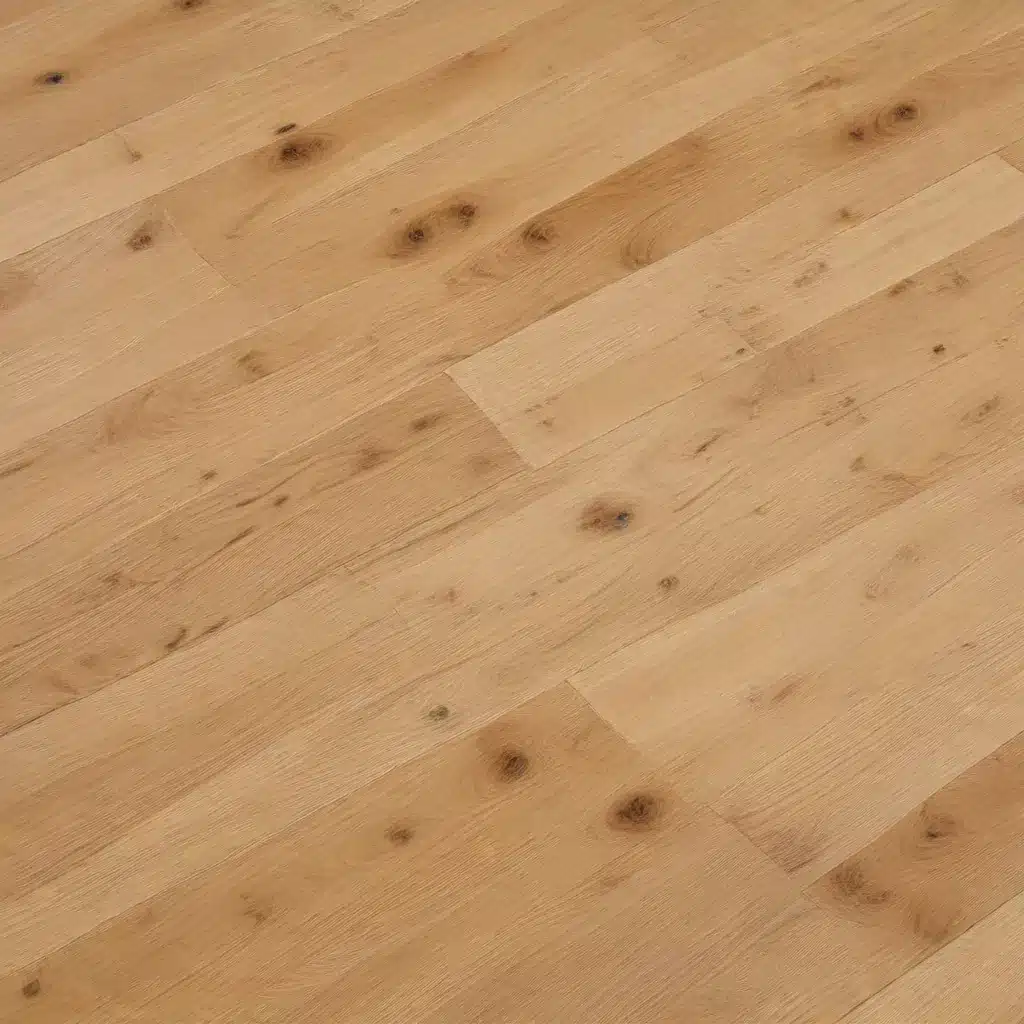
The Beauty and Durability of Engineered Oak Flooring
Engineered oak flooring has emerged as a popular choice among homeowners and designers seeking the timeless charm of hardwood with enhanced durability and eco-friendly advantages. This innovative flooring solution combines the natural beauty of oak with the structural integrity and stability of engineered construction, making it a versatile and sustainable option for a wide range of interior spaces.
At the core of engineered oak flooring is a multi-layered design that sets it apart from traditional solid hardwood. Instead of a single piece of solid oak, engineered planks feature a top layer of genuine oak veneer, supported by several underlying layers of cross-laminated plywood or high-density fiberboard (HDF). This unique construction not only maximizes the use of natural resources but also enhances the flooring’s overall performance and adaptability.
Advantages of Engineered Oak Flooring
Dimensional Stability: The cross-laminated construction of engineered oak flooring helps to minimize the natural expansion and contraction that can occur with changes in temperature and humidity. This increased dimensional stability makes engineered oak an excellent choice for areas prone to moisture or temperature fluctuations, such as basements, kitchens, and bathrooms.
Easy Installation: Engineered oak flooring can be installed using a variety of methods, including glue-down, nail-down, and floating systems. This versatility allows for greater flexibility during the installation process, making it a suitable option for both professional contractors and DIY enthusiasts.
Eco-Friendly Sourcing: Engineered oak flooring utilizes a thinner top layer of oak, reducing the overall amount of wood required compared to solid hardwood. This more efficient use of natural resources contributes to the product’s eco-friendly credentials, as it helps to conserve forests and minimize environmental impact.
Sustainable Finishes: Many engineered oak flooring options feature UV-cured finishes, which are applied and cured at the factory. This process ensures that the finishes are 100% solvent-free, eliminating any off-gassing of harmful chemicals in the home. Additionally, advancements in formaldehyde-free adhesives have made engineered oak an even more eco-conscious choice for indoor air quality.
Aesthetic Versatility
Engineered oak flooring offers a wide range of aesthetic options, catering to diverse design preferences and complementing various interior styles. From classic natural tones to bold, stained finishes, engineered oak can be customized to suit any décor, seamlessly blending timeless charm with modern sensibilities.
Many manufacturers also offer engineered oak planks in varied widths, lengths, and surface textures, allowing homeowners and designers to create unique, personalized flooring layouts that enhance the overall look and feel of a space.
Sustainable Sourcing and Responsible Forestry
As environmental consciousness grows, an increasing number of homeowners are seeking flooring options that align with their eco-friendly values. Engineered oak flooring rises to this challenge, offering sustainable sourcing and responsible forestry practices that benefit both the planet and your home.
Reclaimed and Recycled Wood
One of the most eco-conscious options within the engineered oak flooring category is the use of reclaimed or recycled wood. These materials are salvaged from old barns, factories, or other structures, giving new life to the wood and reducing the need for freshly harvested timber.
The unique character and history of reclaimed wood add a captivating rustic charm to any space, while simultaneously reducing waste and supporting sustainable practices. By choosing reclaimed engineered oak, you can enjoy the beauty of natural wood while contributing to a more circular economy.
Forest Stewardship Council (FSC) Certification
For those seeking the assurance of responsible forestry management, engineered oak flooring with Forest Stewardship Council (FSC) certification is an excellent option. The FSC certification ensures that the wood used in the manufacturing process comes from forests that are managed in an environmentally and socially responsible manner, protecting local wildlife, minimizing pesticide use, and guaranteeing fair working conditions for loggers.
By selecting FSC-certified engineered oak flooring, you can be confident that your choice aligns with sustainable forestry practices and supports the preservation of natural habitats.
Engineered Oak Flooring for Underfloor Heating
One of the unique advantages of engineered oak flooring is its suitability for installation over underfloor heating systems. The multi-layered construction of engineered wood provides superior thermal conductivity, ensuring efficient heat transfer and a comfortable, evenly warmed living space.
Unlike solid hardwood, which can be more prone to dimensional changes and potential damage with underfloor heating, engineered oak flooring is designed to withstand the fluctuations in temperature and humidity that these systems can introduce. This makes engineered oak an ideal choice for homes with underfloor heating, providing both aesthetic appeal and practical functionality.
When installing engineered oak flooring over underfloor heating, it is crucial to follow the manufacturer’s guidelines and consult with professional installers to ensure a successful, long-lasting outcome. Proper preparation of the subfloor, moisture management, and the selection of compatible adhesives or installation methods are all essential factors to consider.
Caring for Engineered Oak Flooring
Maintaining the beauty and longevity of engineered oak flooring requires a few simple steps. Regular sweeping or vacuuming to remove dust and debris, along with occasional damp mopping, will help keep the surface clean and prevent the buildup of grime.
For more thorough cleaning, use a specialized hardwood floor cleaner that is designed for engineered wood. Avoid the use of excessive water or harsh chemicals, as these can potentially damage the floor’s finish and underlying structure.
In addition to routine cleaning, it is recommended to periodically apply a suitable hardwood floor polish or sealant to protect the surface and enhance the flooring’s luster. Always refer to the manufacturer’s instructions for the best products and techniques to maintain your engineered oak flooring.
Enhancing Your Space with Engineered Oak Flooring
Engineered oak flooring offers a harmonious blend of natural beauty, practical durability, and eco-conscious design, making it an exceptional choice for a wide range of interior spaces. Whether you’re drawn to the warm, classic tones of natural oak or the bold, distinctive charm of stained finishes, there is an engineered oak solution to complement your unique aesthetic preferences.
By incorporating engineered oak flooring into your home, you can enjoy the timeless elegance of hardwood while embracing the benefits of modern engineering and sustainable sourcing. This versatile flooring option not only enhances the overall value and appeal of your living spaces but also demonstrates your commitment to making environmentally responsible choices.
Explore the extensive range of engineered oak flooring options available at Oak Floors Online to find the perfect match for your design vision and lifestyle needs. With expert guidance and a dedication to quality, the team at Oak Floors Online is here to help you elevate your home with the beauty and sustainability of engineered oak flooring.
Frequently Asked Questions
Is engineered oak flooring more eco-friendly than solid hardwood?
Yes, engineered oak flooring is generally more eco-friendly than solid hardwood. The multi-layered construction of engineered wood uses a thinner top layer of oak, reducing the overall amount of wood required compared to solid hardwood planks. This more efficient use of natural resources contributes to the product’s sustainability.
Can engineered oak flooring be installed over underfloor heating?
Yes, engineered oak flooring is well-suited for installation over underfloor heating systems. The multi-layered design of engineered wood provides superior thermal conductivity, allowing for efficient heat transfer and a comfortable, evenly warmed living space. Proper installation following the manufacturer’s guidelines is essential when using engineered oak with underfloor heating.
How do I maintain engineered oak flooring?
Maintaining engineered oak flooring involves regular sweeping or vacuuming to remove dust and debris, along with occasional damp mopping using a specialized hardwood floor cleaner. Avoid excessive water or harsh chemicals, as these can potentially damage the floor’s finish and underlying structure. Periodically applying a suitable hardwood floor polish or sealant can also help protect the surface and enhance the flooring’s luster.
What are the key benefits of choosing engineered oak flooring?
The key benefits of engineered oak flooring include:
– Dimensional stability, resisting warping and shrinking
– Versatile installation options, including glue-down, nail-down, and floating systems
– Eco-friendly sourcing, utilizing a thinner top layer of oak to conserve natural resources
– Sustainable finishes, such as UV-cured and formaldehyde-free options, for improved indoor air quality
– Aesthetic versatility, with a wide range of finishes and customization options
How does engineered oak flooring compare to solid hardwood in terms of cost?
Engineered oak flooring is generally more cost-effective than solid hardwood flooring. The engineered construction and efficient use of resources make it a more affordable option, particularly for larger projects or areas with moisture-prone conditions where solid hardwood may not be suitable. However, the specific cost differences can vary depending on the brand, quality, and local market conditions.


